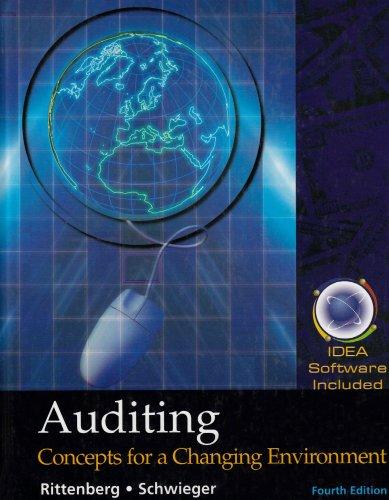The auditor is auditing financial statements for the year ended December 31, 2003, and is completing the
Question:
The auditor is auditing financial statements for the year ended December 31, 2003, and is completing the audit in early March 2004. The following situations have come to the auditor’s attention:
1. On February 12, 2004, the client agreed to an out-of-court settlement of a property damage suit resulting from an accident caused by one of its delivery trucks.
The accident occurred on November 20, 2003. An estimated loss of \($30,000\) was accrued in the 2003 financial statements. The settlement was for \($50,000.
2. Same facts as in 1, except the accident occurred January 1, 2004, and no loss was accrued.
3. The client is a bank. A major commercial loan customer filed for bankruptcy on February 26, 2004. The bankruptcy was caused by an adverse court decision on February 15, 2004, involving a product lability lawsuit initiated in 2003 arising from products sold in 2001.
4. The client purchased raw materials that were received just before year-end. The purchase was recorded based on its estimated value. The invoice was not received until January 31, 2004, and the cost was substantially different than was estimated.
5. On February 2, 2004, the board of directors took the following actions:
(a) Approved officers’ salaries for 2004.
(b) Approved the sale of a significant bond issue.
(c) Approved a new union contract containing increased wages and fringe benefits for most of the employees. The employees had been on strike since January 2, 2004.
6. A major customer was killed in a boating accident on January 25, 2004, in Mexico.
The customer had pledged his boat as collateral. The boat, which was destroyed in the accident, was not insured. The allowance for doubtful accounts is not adequate to cover the anticipated loss.
Required:
For each of the preceding independent subsequent events (which are to be considered material):
a. Indicate and explain whether the financial statements should be adjusted only, adjusted and disclosed, disclosed only, or neither adjusted nor disclosed.
b. Describe how the auditor would have learned about each of these situations.
Step by Step Answer:

Auditing Concepts For A Changing Environment With IDEA Software
ISBN: 9780324180237
4th Edition
Authors: Larry E. Rittenberg, Bradley J. Schwieger





